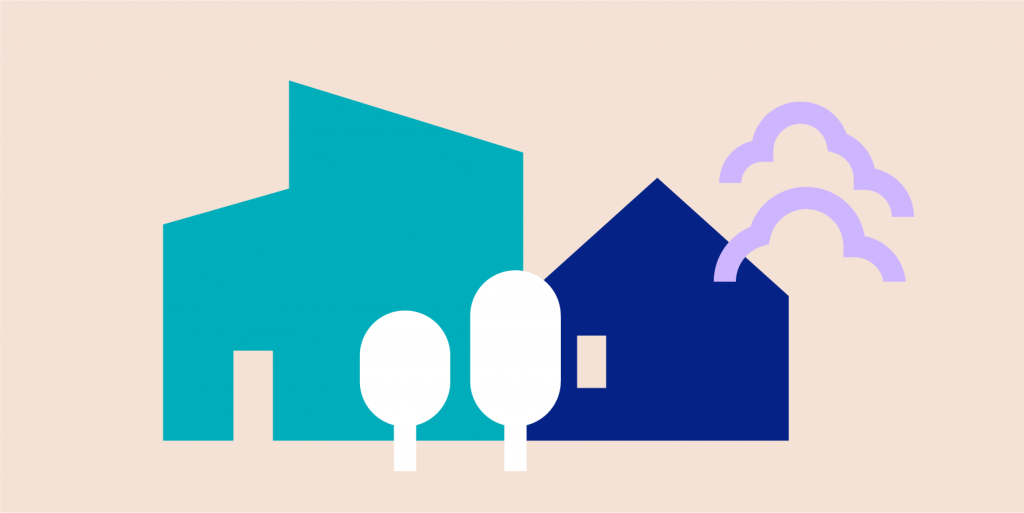Good news: Answering the question, “How much house can I afford?” does not require calculus-level math skills. You just have to start with Trulia’s housing affordability calculator, and then factor in a set of facts about your life.
The life stuff is just as important as the calculator. Things like student loans, local cost of living, childcare, and your hobbies will affect how much house you can afford. And a mortgage lender can lend you as much as you can “reasonably afford,” which could be more than you want to pay. Here’s how to set the right budget for yourself.
Here’s how to determine “How much house can I afford?”
-
Estimate your down payment
Your house budget is based on how much you can afford to pay each month and how much you have to put down. While a 20 percent down payment is ideal, the majority of first-time homebuyers actually put down between 5 and 10 percent.
When deciding how much you’ll put down, keep in mind how that the amount will affect how much house you can afford. For one, the more you put down, the less you’ll need to borrow in your mortgage, and the less you’ll pay each month. Also, if you put down less than 20 percent, you’ll need to calculate private mortgage insurance, or PMI, into your monthly mortgage payment. PMI is typically 0.2 percent to 1.5 percent of your loan.
When adding up how much you have saved for a down payment, don’t forget to leave room in your savings for closing costs, which will run 2 to 5 percent of the total cost of the home.
-
Map out your (realistic) monthly budget
It can be tempting to take the maximum amount a mortgage lender will give you and buy the biggest, nicest house you can. But if you have monthly expenses for things that make you happy or things you need—anything from yoga classes to your health insurance premium—make sure you don’t take a mortgage that’s so large you have to make lifestyle changes you don’t intend to make.
Take a look through your monthly budget to determine what payment would fit into your life today, and base your house-hunting budget on that intel.
-
Use your debt (or lack of debt!) as a guide
Most people have debt. Because a mortgage is going to add to that debt, taking the sum of your total debt now can help you determine how much more debt you should take on to buy a house. Here are three ways to use your debt to determine your housing budget:
- One rule of thumb says you can afford a home that’s three to five times your household income—depending on your debt. So if you have $100,000 in income and no debt, feel free to consider that $500,000 midcentury modern ranch you’ve had your eye on. But let’s say 20 percent of your income goes to paying down debt—then you’ll want to look at homes closer to the $300,000 range.
- Your mortgage payment, including taxes and insurance, shouldn’t exceed 28 percent of your pre-tax income.
- All your debt—including your future mortgage payment—shouldn’t exceed 36 percent of your pre-tax income.
-
Gauge your potential interest rate
The interest rate you’ll get on your loan will help determine your monthly payment. Even a half a percentage point can make a big difference every month. Your lender will set your interest rate using a bunch of factors, including:
- Credit score
- Down payment
- Type of mortgage (like FHA, USDA, or VA
- Interest type ( fixed-rate versus adjustable-rate)
The federal interest rate does change over time, and that will also affect your potential interest rate. One easy way to estimate what yours could be is with the Consumer Finance Protection Bureau’s interest rate tool.
-
Factor in local costs
Where you live determines your interest rate, property taxes, and more. Take a look at where you want to live, down to the neighborhood, to determine the unique costs of buying a home there:
- Property taxes: These will vary based on your town and school district. Find out your local tax rate and multiply it by the assessed value of a home for an estimate.
- HOAs: Some neighborhoods and condo developments have homeowners association fees. If you’re looking in a particular area, leave room in your monthly budget for these.
With these factors in mind, you’ll be able to determine your budget. But before you get too far into the home buying process, you may want to understand a bit about your local housing market so you know where and when to look for your new home.



